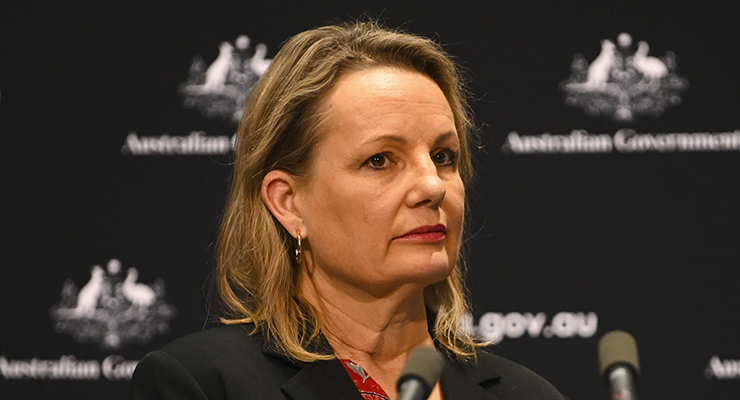
It could’ve saved Australians $5.9 billion in motoring costs, seen a much wider variety of electric vehicles (EV) in our short-supplied car market, and possibly left us with cheaper petrol, the Australia Institute’s Richie Merzian says.
Yet Australia remains one of the only countries in the OECD without fuel efficiency standards, something Merzian — the climate and energy program director at the think tank — says has put our national security in jeopardy.
Opposition minister for small business Sussan Ley was left red-faced this week after incorrectly stating “no one in the world is making an electric ute”, continuing that “even if they were, it would be unaffordable”.
A spokesperson told SmartCompany that Ley, who is also the opposition minister for industry, skills and trade, actually meant to say “EV utes are not yet commercially available in Australia”.
But independent Dr Sophie Scamps retorted that at least one EV ute already on New Zealand’s roads is “not available here because of scare campaign run by the previous government and [because] Australia has amongst the world’s worst fuel efficiency standards”.
Merzian agrees.
“The Coalition government might as well have an electric ute made out of metal with a plaque reading ‘I stopped these’,” Merzian told SmartCompany.
“Because they have gone out of their way to slow down the uptake of cleaner cars, not just electric cars, leaving Australians paying more to drive the same amount of distance as more efficient cars in other markets.”
So what is a fuel efficiency standard and why has its absence led to Australia becoming a global laggard when it comes to getting electric utes on our roads?
How did we get here?
A fuel efficiency standard is a cap on the overall amount of emissions a car manufacturer could have across all its vehicles, which would ideally steer it towards creating more efficient models — like EVs.
A manufacturer’s overall limit would taper off over a period of years in order to drive down our emissions — transport accounts for 17% of Australia’s greenhouse gases — and if a manufacturer exceeded its fuel efficiency standard limit, it would be fined.
In 2014, Australia’s Climate Change Authority officially backed the idea, finding the introduction of fuel efficiency standards would slash the emissions of light vehicles by nearly half, from 192g to 105g of carbon dioxide per kilometre travelled, by 2025.
But the Coalition government did not implement the authority’s recommendation, and Australia quickly became an outlier on the world stage as 80% of the car manufacturing market moved forward with standards.
In the lead-up to the 2019 federal election, Labor proposed it would look at implementing fuel efficiency standards, which quickly provoked an effective Coalition scare campaign about the opposition waging a “war on the weekend”.
“There’s been a history of misinformation perpetuated by the Coalition and obviously they haven’t changed,” Merzian said.
In 2020, the Federal Chamber of Automotive Industries took up the mantle when it announced a new industry-led standard that would reduce emissions by 4% a year, meaning light-duty vehicles now include a sticker showing a car’s fuel consumption and CO2 emissions.
But it’s voluntary, Merzian points out, and mostly weighted towards hybrid vehicles, which are “basically fossil fuel cars” considering how often they revert to petrol as a source of power, he says.
“The best thing we could do is adopt a robust standard in line with Europe.”
And if we had, Merzian says, we might’ve felt that benefit at the bowser when the Russia-Ukraine conflict shorted the worldwide gas market, sending petrol prices soaring.
This month, the Australia Institute’s Fuelling Efficiency report found Australia would have needed to import 4000 megalitres less fuel if we had introduced the fuel efficiency standard in 2015.
Less demand for gas might’ve seen our emergency fuel storage — which is supposed to be 90 days’ worth — topped up far above its current level of 58 days’ worth too, Merzian says, and possibly diverted it to where it’s more urgently needed, like defence.
“We should be getting onto electric vehicles as a matter of national security,” he said.
Is this all about to change?
It’s likely. The Albanese government has announced it will consider introducing fuel efficiency standards for passenger vehicles, largely thought to be the first of many steps in rolling out the measure in Australia.
“We believe that now is the time to have a sensible discussion about whether fuel efficiency standards could help improve the supply of electric vehicles into our market, to address the cost-of-living impacts of inefficient cars and to reduce emissions from the transport sector,” Energy and Climate Minister Chris Bowen said.
“To me, this is ultimately about choice. And policy settings are denying Australians real choice of good, affordable, no emissions cars.”
But first we’ll see a consultation paper next month that will delve into our EV strategy in meeting our soon-to-be-legislated 43% reduction in emissions target, with the industry, union and consumer bodies to give feedback.
The paper will also reveal the government’s plan to get people buying EVs, which only account for about 2% of new car sales at the moment, compared to 15% in the UK and 16% in the European Union.
The government is also planning to erect charging stations every 150km on major roads, Bowen said, and lead by example in electrifying three-quarters of the Australian government’s fleet of cars by 2025.
Earlier this year, the UK and European markets announced they’d bar petrol cars by 2025 and 2035 respectively. It seems that to do nothing is a fraught option — as it stands, Australia is on track to become a graveyard for gas-guzzling cars, Bowen warned.
“Consumers aren’t getting the choice available internationally and as the world moves towards more efficient and cleaner vehicles, Australia risks becoming a dumping ground for older technology which can’t be sold in other markets,” he said.








Stupidity shows in many forms, no more so than in LNP politicians. The LNP have almost revelled in displaying one of the most fraudulent, nonsensical climate policies on the planet. The laughable display in Glasgow says it all. Now Sussan Ley and Dutton insist on doubling down on a scale of ineptitude that leaves me speechless.
How on earth can these fools believe they have the nous to govern anything, least of all charting a future for our country. That is clearly not a priority for them.
There really must be introduced some form of serious civil or criminal penalty for what we’ve observed, going beyond idealogical boundaries, based on a “good for the nation” test. A PM of dubious history and competence.
$450 million of public money to the “Barrier Reef Foundation”…no agenda, reporting or updates required. 2,500 deaths by suicide with Robodebt, and nobody responsible. $80 million in water bonuses by a clearly “gamed” water scheme by Taylor. Privatised NDIS scams at every turn. Refusal by Dutton to attend the “jobs, jobs, jobs”, summit, a topic “close” to Morrison’s heart.
Every step of the way, all the LNP key players are involved. Liars, frauds, scammers, and worse.
How refreshing, to not see the incompetence, the cover-up, the denials and the old favourite – “no laws were broken”, or “it was all done inside the rules”, et al. How refreshing, to not see all those professionally staged photos of Morrison in hi-vis, as he blunders his way through some other self-induced crisis, lying his snarly, dishonest little mouth off.
As you say, a serious civil or criminal penalty is necessary, in the wake of Morrison’s unthinkable trashing of our parliamentary democratic system, regardless of how flawed it may be.
Yep. As you say Jim, 100 days of a new Government, actually “DOING” something for the nation, attempting to rectify 10 years of gobsmacking incompetence.
Morrison’s hi-vis, matched perfectly by the hi-vis clad Canavan pro-coal owner of a coal mine, with his coal-dust smeared smirking visage on his social media posts. Truly laughable.
Great stuff, as the intellectually limited LNP make themselves increasing irrelevant.
““There’s been a history of misinformation perpetuated by the Coalition and obviously they haven’t changed,” Merzian said.”
And they won’t. Ley altered her own name from “Susan” to “Sussan” on the basis of numerology.! That’s the type of mind we are dealing with.
We have to blame the the voters for being so gullible they listen to the propoganda especially the pensioners they sold Australia out with a older population it is hard to enact change.
Were those pensioners who own no shares , the ones frightened about losing their franking rights?
Sussan ‘Leym’ – ex-“Minister for Environmental Vandalism” – a twittering remnant of a Coalition government that ran interference for their fossil fuel sponsor benefactors.
Why did Ley do something so incredibly stupid as lie about EVs when the Morrison-Cash EV lies are still fresh in the minds of so many? The need for fossil fuel donations with the NSW and Vic elections coming up?
I smiled at the line: Sussan Ley was left red-faced this week after incorrectly stating ….
She is incapable of being embarrassed. Her every utterance seems to me to be inane.